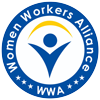Women Workers Alliance Karachi – A group of women workers from 14 districts of Pakistan, including a provincial coalition and a national coalition fighting for the rights of women workers, and raising voice. Women make up half of our population and their involvement in economic activities can improve not only their families but also the national economic situation. There are reasons for deprivation.
Gaps in labor laws, non-compliance and impractical legislative provisions are reasons why many workers are denied access to their labor rights. In the absence of applicable labor laws, the Women Workers’ Alliance has demanded from the government that those sectors to which labor laws do not apply or which the Department of Labor deems out of its reach be included in the labor legislation and administration system. Take immediate action to add. The Alliance observed that many workers were facing unfair treatment in the workplace and that the last few years had seen an increase in the number of workers in the services sector. Government-provided policies, subsidies, etc., and non-compliance with labor laws and unequal wages and discriminatory conditions for equal value work are major barriers to women’s workforce that hinder their economic participation.
The Alliance observes that many workers are being treated unfairly. The government has not taken stock of the changing market movements that are not only changing labor patterns but also unfair labor practices. Is also giving birth. Such as the emergence of e-commerce platforms, app-based jobs, the sole employer employing people for commission-based work without guaranteeing fair working conditions to ensure that labor laws with workers While being treated fairly, limited access to labor laws is a major reason why millions of women workers are unrecognized despite making a significant contribution to the economy.
Similarly, unequal wages and discriminatory conditions for equal value work are major concerns for women’s workforce that hinder their economic participation. Labor laws relating to wages and conditions for employment need to include provisions to address gender discrimination at work. One of the basic instruments of the ILO ratified by Pakistan is compliance with the ILO Convention on Equal Compensation C-100 in Labor Laws and the C-111 Convention on Discrimination (Employment and Profession) to improve women’s participation in the workforce. Are of great importance. There are huge loopholes in the labor laws regarding the special provisions on the rights of women workers. Women are paid much less than men for the same amount of money and form of work. While the Sindh Payments of Wages Act, 2015 has a section on wage non-discrimination between men and women, there is no such mention in the Sindh Factories Act 2016 and it discriminates between workers of factories and shops or establishments within the province. The behavior is created. Including the provision of equal pay for equal value work. Furthermore, sexual harassment in the workplace has been a major factor discouraging women’s participation in the economy and calls on the state to take strict legislative and administrative measures to prevent it. Provides severe imprisonment with fines depending on the severity of the crime. Various laws and penalties against sexual harassment of women have been included in Pakistan such as (PPC 354, 354-A, 355, 506) which Women are subject to certain penalties for threatening behavior and their self-esteem. These penalties and fines are imposed under provisions that are inadequate. The absence of severe penalties does not reduce the incidence of sexual harassment. For this, an ombudsman or commission of inquiry should review the severity of the incident of sexual harassment and prescribe punishment accordingly. The Women’s Workers’ Alliance demands that the punishments provided in the Pakistan Penal Code be adjusted according to the severity of the incident and the nature of the crime so as to reduce the incidence of sexual harassment and reduce the insecurity of women. Involvement in economic activities can be increased.
The Alliance calls on the government to take immediate action to include the excluded sectors of employment in the labor legislation and management system. It also meets the physical protection and occupational health needs of workers
The Women Workers Alliance (WWA) demands that under the Penal Code penalties, crimes under the Harassment Protection Workplace Act should be classified as comprehensible and incomprehensible and punishments should be based on the severity of the offenses. Should be coordinated
The WWA emphasizes that the government needs to tackle the problem of sexual harassment with iron fists so that more women can be allowed to participate in a safe and conducive work environment.

